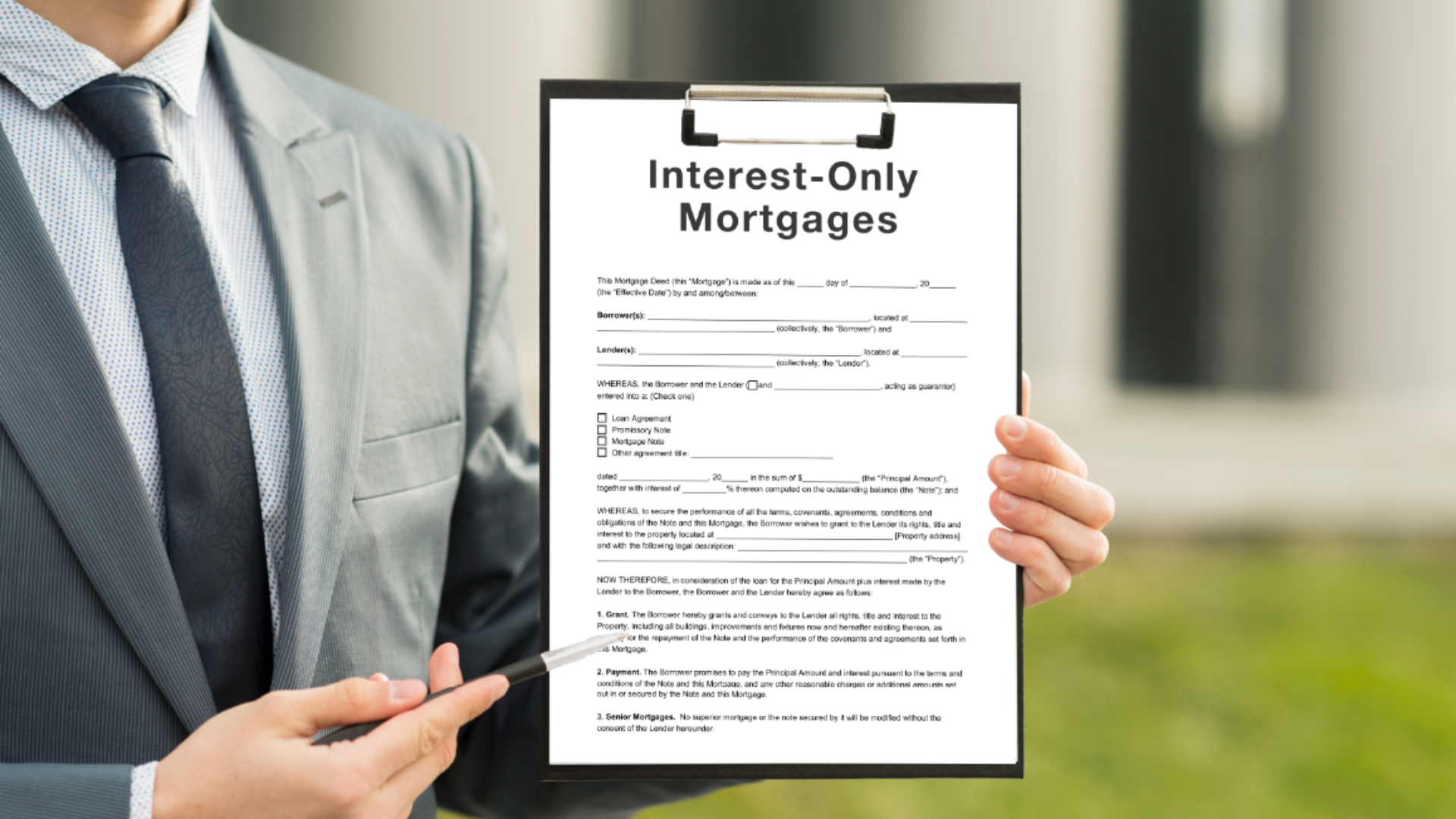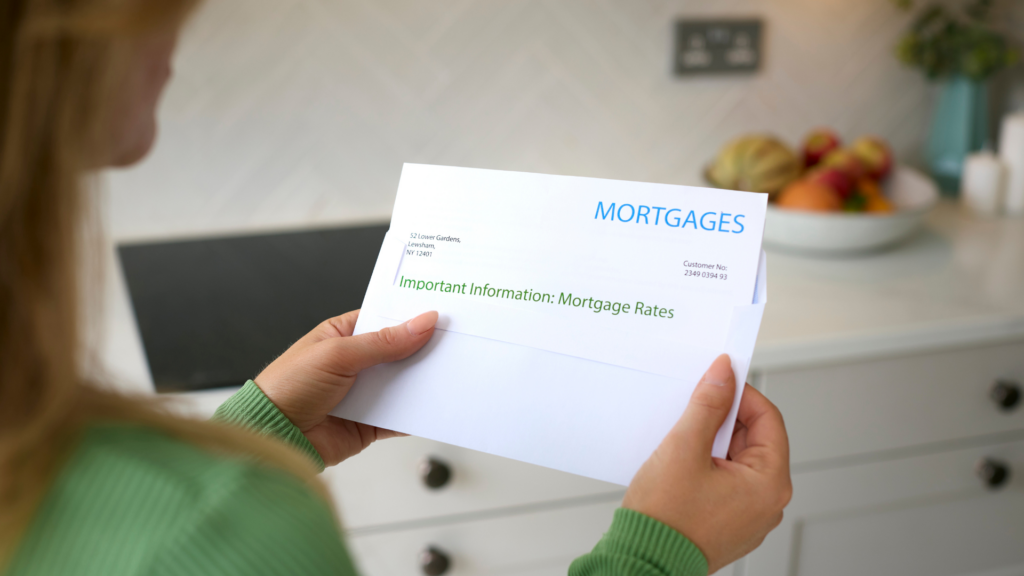- What Is an Interest-Only Mortgage?
- Are Interest-Only Mortgages Still Available?
- How Interest-Only Mortgages Compare to Repayment Mortgages
- Are You Eligible for an Interest-Only Mortgage?
- How Much Can You Borrow with an Interest-Only Mortgage?
- What Interest Rates Can You Expect?
- Should You Get an Interest-Only Mortgage?
- What Can You Do If You Canât Repay the Mortgage?
- Are There Other Ways to Get a Mortgage with Low Monthly Payments?
- Key Takeaways
- The Bottom Line
Interest-Only Mortgages: The Ultimate Guide You Need

If you want to keep your monthly mortgage payments low, you might have considered interest-only mortgages.
These mortgages let you pay just the interest each month, which can significantly reduce your costs.
But is this the right option for you? 🤔
In this guide, we’ll explore how interest-only mortgages work, what criteria you need to meet, and whether they could be a good fit for your financial situation.
Let’s get started!
What Is an Interest-Only Mortgage?
An interest-only mortgage lets you pay just the interest each month. This can make your monthly payments much lower, making the mortgage more affordable in the short term.
However, at the end of the term, you’ll still owe the full amount you borrowed.
Because of this, lenders want to see a strong repayment plan, also called a “repayment vehicle,” to make sure you can pay off the debt when the mortgage ends.
Here’s an example of how it works:
Let’s say you borrow £200,000 on an interest only basis over 25 years at 3% interest. This means you’d pay £500 per month.
But after 25 years, you’d still owe £200,000. You’ll need to convince the lender that you can repay this amount when the time comes.
Image
Are Interest-Only Mortgages Still Available?
Yes, you can still get interest-only mortgages in the UK. But, they are not as common as they were before the 2008 financial crisis.
Many lenders pulled back from offering them due to concerns about borrowers being able to repay the full loan.
Today, these mortgages are more often used for buy-to-let properties and second homes. But some lenders still offer them for residential purchases under strict conditions.
How Interest-Only Mortgages Compare to Repayment Mortgages
The main difference is that with an interest-only mortgage, your monthly payments are much lower because you’re only paying the interest.
With repayment mortgages, you pay both the interest and part of the loan balance each month, so you’ll own the property outright at the end of the term.
Let’s use the same example earlier – If you took out a £200,000 mortgage with an interest-only mortgage rate of 3%, you’d pay about £500 a month.
On a repayment mortgage, your payments would be closer to £950 per month, but at the end of the term, the property would be fully yours.
Image
Are You Eligible for an Interest-Only Mortgage?
The criteria for interest-only deals is much stricter than repayment mortgages. Here are the key factors you must consider before applying for this mortgage:
Income Requirements
Many lenders have minimum income thresholds for interest-only mortgages.
For residential mortgages, you typically need a minimum annual income of around £75,000. For joint applications, this increases to £100,000.
For buy-to-let properties, the income criteria may be less strict, as lenders will also assess the expected rental income.
But, every lender is different. It’s always advisable to check the specific requirements with individual mortgage lenders. 🙂
Deposit or Equity
Interest-only mortgages usually need a bigger deposit or more equity in the property than repayment mortgages.
For residential properties, you might need up to 50% equity, while for buy-to-let, you may need a deposit of at least 25%.
This is to protect the lender if property values fall.
And remember, the bigger your deposit, the more likely you are to be approved and to get a better interest rate.
Credit History
As with any mortgage, a good credit score can help you get approved for an interest-only mortgage.
Some lenders are more flexible than for repayment mortgages. However, serious problems like defaults or bankruptcies could still hurt your chances.
If you’re unsure about your credit score, it’s worth checking before you apply. Download your credit report from credit agencies – Equifax, Experian, and TransUnion – and check for any mistakes.
To improve your credit score, read our guide on how to improve your credit score in the UK.
Property Requirements
Some lenders have rules about the types of properties they’ll accept for interest-only mortgages.
For example, they might not offer interest-only mortgages on new-build properties or homes that are not built in a standard way.
There might also be minimum property value requirements.
Nationwide, for example, requires a minimum property value of £300,000 in Greater London, £250,000 in the Outer South East, and £200,000 in all other UK regions for interest-only mortgages.
Property Experience
Many lenders favour borrowers with landlord experience for buy-to-let interest-only mortgages.
This experience demonstrates your ability to manage properties and maintain consistent rental income, reducing the lender’s risk.
First-time landlords may qualify, but they will likely have to meet stricter rules, such as bigger deposits or more stricter income check
For bigger or more complicated investments, like HMOs, some lenders might even ask for proof that you have managed similar properties before.
Age Requirements
Age can be important when getting an interest-only mortgage. Most lenders have both minimum and maximum age limits.
Usually, you must be at least 18, and the maximum age at the end of the mortgage term
But, some lenders might be more flexible, especially for buy-to-let mortgages, allowing older borrowers to go beyond this age if they can show they can afford it.
For people nearing or already in retirement, lenders offer Retirement Interest-Only (RIO) mortgages.
Unlike traditional interest-only mortgages, RIO mortgages don’t have a fixed end date, and the loan is usually repaid when the borrower dies, sells the property, or moves into long-term care.
Some lenders might also have stricter rules based on age, such as requiring proof of pension income or other assets to make sure the loan can be repaid.
The older you are, the more important it is to show a solid repayment plan, as lenders will want to see that you can afford the loan well into retirement.
Repayment Vehicle
A repayment vehicle is a plan to pay back the full loan amount when your interest-only mortgage ends.
And this is the most important factor for approval.
You must show a reliable way to repay the loan when the term ends. Acceptable repayment vehicles can include:
- Selling the mortgaged property (if you have sufficient equity)
- Savings and investments (ISAs, stocks and shares, bonds)
- Endowment policies
- Pension lump sums
- Sale of other high-value assets
Each lender has its own list of acceptable repayment strategies.
For instance, Barclays doesn’t allow relying solely on the sale of the mortgaged property to repay the loan.
You’ll need to show evidence of your chosen repayment strategy as part of your mortgage application. Lenders may also check periodically to ensure your strategy remains on track.
How Much Can You Borrow with an Interest-Only Mortgage?
For interest-only mortgages, how much you can borrow depends on your income and the loan-to-value (LTV) ratio.
You can usually borrow up to 4-4.5 times your annual income for a residential mortgage.
But, the maximum LTV is often lower than for repayment mortgages, so you’ll need a bigger deposit—usually around 50%.
For buy-to-let mortgages, lenders also look at potential rental income. They often lend up to 75% of the property’s value (LTV).
Some might combine your personal income with rental earnings to see if you can afford it, but the rental yield is usually the most important factor.
To see how much you can borrow, use the mortgage affordability calculator. This gives you an estimate of your mortgage amount based on your income.
What Interest Rates Can You Expect?
Interest-only mortgage rates are usually similar to those for repayment mortgages. You can choose between fixed and variable rates.
However, because lenders see interest-only mortgages as higher risk, rates might be slightly higher than for similar repayment mortgages.
As with any mortgage, the interest rate you get will depend on factors like your deposit size, credit score, and overall financial situation.
Shopping around and comparing offers from different lenders can help you find the best interest-only mortgage rates.
Should You Get an Interest-Only Mortgage?
Before you decide, it’s important to know the pros and cons. Here’s a breakdown:
Pros
- Lower monthly payments compared to repayment mortgages.
- Suitable for buy-to-let investors who can use rental income to cover interest payments.
- More flexibility in budgeting since you’re not paying down the capital each month.
- Can help with short-term cash flow management, freeing up funds for other investments.
- In some cases, you can sell the property to repay the loan, potentially benefiting from property value appreciation.
Cons
- You still owe the full loan amount at the end of the term, which can be a large lump sum to manage.
- Interest-only mortgages can be more expensive overall because you’re paying interest on the full loan balance throughout the term.
- Lenders consider them higher risk, which means stricter eligibility criteria.
- There’s a risk that the repayment vehicle (e.g., sale of property or investments) may underperform, leaving you unable to repay the loan.
- If property values fall, you may owe more than the property is worth (negative equity), especially in a down market.
- You don’t build equity in the property during the mortgage term unless you make additional capital payments.
What Can You Do If You Can’t Repay the Mortgage?
If you find yourself unable to repay the loan at the end of the term, here are some options:
- Switch to a repayment mortgage. You can change your loan to a repayment mortgage, though your monthly payments will increase because you’ll be repaying both capital and interest.
- Remortgage. If your lender offers better rates or terms, you can remortgage to another interest-only or repayment mortgage. Some lenders may also offer part-and-part mortgages, where part of the loan is interest-only, and the other is on a repayment basis.
- Sell the property. Selling the property is often the easiest solution for many borrowers. The sale proceeds can be used to pay off the mortgage in full, especially if the property has appreciated in value.
- Extend the mortgage term. In some cases, your lender may allow you to extend the mortgage term, giving you more time to repay, though this may not always be possible depending on your age and the lender’s terms.
- Seek advice. If you’re struggling, it’s important to seek financial advice as early as possible. A mortgage broker or financial advisor can help you explore your options, including restructuring the loan, finding a more affordable product, or seeking alternative solutions like equity release (if you’re over 55).
Are There Other Ways to Get a Mortgage with Low Monthly Payments?
Yes, there are other ways to get a mortgage with lower monthly payments. Here are a few options:
- Longer mortgage term – You can extend your mortgage to 30 or 40 years, lowering your monthly payments. But you’ll pay more interest overall.
- Part-and-part mortgage – This mortgage lets you pay interest on part of the loan while repaying capital on the rest. It offers lower monthly payments than a full repayment mortgage but reduces the lump sum you owe at the end compared to an interest-only mortgage.
- Offset mortgage – This lets you link your savings to your mortgage to reduce interest and lower your payments.
- Fixed-rate mortgage with a low initial rate – Some lenders offer low fixed rates for the first few years of the mortgage. This can be cheaper for a few years but might get more expensive later.
- Government schemes – Some government programs like First Homes or Shared Ownership can help you buy a home with lower monthly payments.
Key Takeaways
- Interest-only mortgages lets you pay just the interest each month, with the full loan amount due at the end of the term.
- Lenders require a strong repayment vehicle, such as selling the property, investments, or savings.
- You’ll need a larger deposit or more equity compared to repayment mortgages, and income thresholds are usually higher.
- If you can’t repay, options include switching to a repayment mortgage, remortgaging, selling the property, or extending the term.
- Other ways to lower monthly payments include longer mortgage terms, part-and-part mortgages, offset mortgages, and government schemes.
The Bottom Line
Interest-only mortgages offer lower monthly payments than repayment mortgages. But, they have stricter lending rules because they’re riskier.
If you think this option suits you, finding the best deals can be tricky without expert help. A mortgage expert can:
- Access exclusive deals you won’t find on your own
- Guide you through the tricky eligibility requirements
- Provide advice tailored to your financial goals
- Help you choose the right repayment plan
- Save you time by handling the paperwork and lender communications
Still unsure? Get in touch with us. We’ll connect you with a qualified mortgage broker to help you solve your specific mortgage situation.
Get Matched With Your Dream Mortgage Advisor...

Frequently asked questions
What are the risks of interest-only mortgages?
Interest-only mortgages can be tempting because of lower monthly payments, but they come with risks.
The biggest risk is that you’ll still owe the full loan at the end of the term. If you can’t repay it, you might need to sell your home or find another way to pay.
There’s also the risk of negative equity.
If house prices drop, you could owe more than your home’s worth. You need a solid repayment plan and should get professional advice to manage these risks.
Can first-time buyers get interest only mortgages?
While it’s possible, it’s rare.
Lenders see first-time buyers as higher risk and usually offer these mortgages to experienced homeowners or buy-to-let investors.
If you’re a first-time buyer, you’ll likely need a large deposit or a high income to qualify, which makes it harder to get this type of mortgage.
Can I switch from a repayment mortgage to an interest only mortgage?
Yes, you can switch to an interest-only mortgage. But you’ll need to meet your lender’s conditions.
These usually include having a large amount of equity in your home – often 50% or more – and a clear repayment plan, like investments or selling the property.
Lenders will also check your income and affordability before approving the switch.
What happens if I can't repay the capital at the end of an interest only mortgage term?
If you can’t repay, you might need to sell your home, remortgage, or extend the loan term. It’s crucial to have a solid repayment strategy in place from the start.
Are interest only mortgages more expensive in the long run?
Yes, because you’re not paying off any of the capital, you’ll pay more interest over the life of the loan compared to a repayment mortgage.
Can I make overpayments on an interest only mortgage?
Many lenders allow overpayments, which can help reduce the amount you owe. Check with your specific lender for their overpayment terms.




